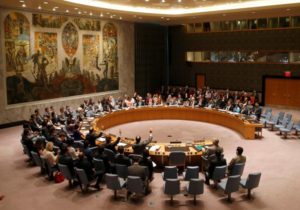U.S. Palestine Plan Bogs Down, Britain Doubts Israel’s Legality, NY Herald Tribune, May 20, 1948.
 Click here to view the original article.
Click here to view the original article.
By John G. Rogers
LAKE SUCCESS, L. I., May 19-The United Nations Security Council made it plain today that the United States cannot muster the required votes for its proposal to declare the Palestine war a formal peace breach and to order a cessation of fighting under threat of economic sanctions or U. N. military intervention.
Great Britain, Belgium and China came out against the American proposal, which would need seven votes for passage and so far is supported only by the unusual trio of the United States, the Soviet Union and the Ukraine.
Britain, which has not recognized the Jewish provisional government of Israel, told the Council in addition that it questions the legal validity of the new Jewish state and that it would like to see the U. N. make a thorough study of that matter.
In opposing the American plan, British delegate Sir Alexander Cadogan offered a plan of his own-a resolution which simply would have the Security Council make a plea to the Palestine battlers to stop fighting, but which would not support the plea with threats of stronger U. N. action.
American delegate Warren R. Austin immediately opposed the British plan and criticized it caustically. On four previous occasions, he said, the Security Council had directed hopeful case-fire pleas at Palestine and none of them was heeded. Was it not time, he asked, to admit the “futility” of that course?
The Counsel’s duty was plain, Mr. Austin contended. There is war in Palestine. The Council is supposed to stop it. Since the Council’s previous pleas went unheeded, the Council now must undertake stronger action, he said.
In debate that followed, it became clear that more than one U. N. country is mindful of the past record of the United States on Palestine, and is determined not to be led by the United States into any more alleys that end in frustration on the Palestine problem.
Fernand Van Langenhove, of Belgium, said it was very well to raise the prospect of economic sanctions and U. N. military intervention against Palestine aggressors, but he recalled that League of Nations sanctions against Italy failed miserably in the Ethiopian case.
He stressed a point that Mr. Austin had by-passed in his arguments-that U. N. has no military force for intervention anywhere because the Big Five nations are so racked by suspicion and distrust that they never have agreed on a formula of setting up a U. N. force.
Chinese delegate Dr. Tingfu F. Tsiang asserted that the effect of the American plan, if it was enforced, would be to enforce the partition of Palestine under the U. N. aegis, and he added that he had never agreed that partition was a just solution for the Palestine problem.
Both China and Belgium said they would support the general idea of the British resolution-a plea for Palestine peace that was not supported by U. N. threats.
For Britain, Sir Alexander told the 296th meeting of the Council that his government was not convinced that the Palestine situation is a threat to or a breach of international peace, and he said that an attempt to determine who were the aggressors in Palestine would lead to “interminable and probably unprofitable wrangles.”
Britain, which finances officers and supplies the Trans-Jordan Arab Legion now fighting in Palestine, was believed not to want to risk having aggressor blame laid at the British door in case the U. N. should determine the Arabs were the aggressors.
Mr. Van Langenhove said at one point that although it was conceded that Egypt and Trans-Jordan have invaded Palestine, that did not necessarily implying-
Aubrey Eban, of the Jewish Agency for Palestine, which represents Israel though still under the Agency title, strongly attacked any possible defense of the right of Egypt and Trans-Jordan to invade Palestine or to receive tacit justification from the U. N. for their invasion.
The U. N. Charter, he said, pronounced the use of force as legitimate only in two instances- for self-defense when attacked, and for collective action asked or ordered by the U. N.
But, he said, have the Jews attacked Egypt? Or has the U. N. aggression or a breach of the peace, asked Egypt to send its forces against Palestine? Mr. Eban recalled that Egypt told the Council last week that it was not entering Palestine to kill or destroy, that it would not attack those who did not first attack Arabs.
What about the 100 Jewish civilian casualties suffered yesterday when Egyptian planes bombed and machine-gunned the central bus terminal in Tel Aviv? Mr. Eban asked. Had any of those Jews attacked Egypt?
Mr. Eban generally supported the American resolution, but whereas it asked for a cease-fire order to be issued throughout Palestine within thirty-six hours of the time the Council approved the measure, he asserted the cease-fire order should be issued immediately after approval.
Meanwhile, Mr. Eban presented to the U. N. today the following communication received from Moshe Shertok, Foreign Secretary of Israel-
“From documentary evidence received by us it appears that arrangements were made by British authorities to ship a considerable quantity of military equipment to the Arab Legion, times so as to reach Trans-Jordan on May 14 and May 15 coincident with termination of the mandate. Trans-ported on three vessels from Suez to Akaba, the shipment comprises petrol, forty-eight Oerlikon guns and ammunition and 255 tons of other ammunition, and was carried out with full knowledge by British intelligence of the activities and intentions of the Arab Legion.”



